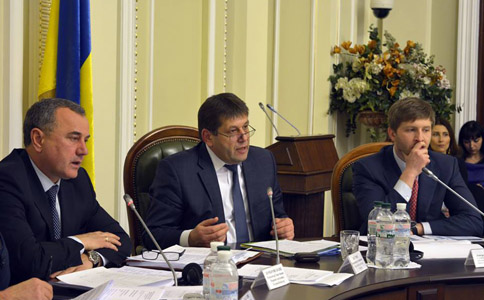Ukraine Faces "Serious Shortcomings" over Gas Reform
Ukraine has been urged to finalise gas sector reforms by Janez Kopac, director of Energy Community that regroups EU and non-EU states in Europe.
He chaired a meeting April 5 between international donors (European Commission, IMF, World Bank and EBRD) and Ukraine represented by deputy prime minister Volodymyr Kistion which focused on recently adopted decisions by the Ukrainian cabinet relating to gas market design and outstanding issues needed to complete gas reforms there.

Ukraine's deputy PM Volodymyr Kistion in centre (Photo credit: government)
According to an EC statement April 6, Kopac briefed participants on the results of the EC secretariat’s analysis. This concluded that the majority of measures outlined in the Gas Sector Reform Implementation Plan, co-signed two years ago by Ukraine, World Bank and the Energy Community secretariat, had been adopted and transposed into Ukrainian law. But the analysis found that "serious shortcomings relating to implementation of the adopted measures remain."
The two most critical outstanding issues are a delay in the unbundling of Naftogaz and the current subsidy policy that endangers the functioning of district heating companies and prolongs the need for a non-compliant public service obligation scheme. Participants of the meeting agreed to design in the next weeks a roadmap of further actions to finalise gas sector reforms until the end of 2017.
Ukraine’s cabinet approved November 9 a resolution to create a state company to run the country’s gas grid. In February 2017 the government also consulted over new draft rules to improve storage terms and transparency.
Mark Smedley



